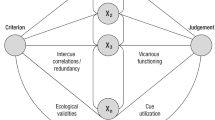Abstract
We quantify the sensitivity of the traveler’s dilemma (Basu, Am Econ Rev 84:391–395, 1994) to perturbations from common knowledge. The perturbations entail a small uncertainty about the set of admissible actions. We show that the sensitivity scale is exponential in the range of admissible actions in the traveler’s dilemma. Such rapid growth is consistent with the intuition that a wider range makes the outcome of the traveler’s dilemma less intuitive.


Similar content being viewed by others
Notes
The more common story of the TD is of claims between 2 and 100 (and this way no player can ever receive a negative payoff). We start from 0 for convenience, to make indices more readable later on.
A strategy is strictly dominated if there exists another strategy, or a mixture of strategies, that yield a strictly higher payoff for any choice of the other players.
It is also the unique rationalizable pair of actions, since in a two-player game rationalizability is equivalent to iterated elimination of strictly dominated strategies.
And moreover, the distance from (0, 0) is bounded by an exponentially decreasing function.
In the above sense, i.e, the probability of the payoffs being the same as in G tends to one.
Any strategy is in fact stationary, depending only on the current state and the type \(t^i\), and not on the history, because when the current state is \(s_1\) there can be only one history, and when it is \(s_2\) there is no choice of action. This is irrelevant to the proof, however.
“Prisoner’s dilemma” being any \(2 \times 2\) game in which one action (“Defect”) dominates the other (“Cooperate”), and both players prefer mutual cooperation to mutual defection.
References
Aumann RJ (1992) Irrationality in game theory. In: Dasgupta P, Gale D, Hart O, Maskin E (eds) Economic analysis of markets and games: essays in honor of Frank Hahn. MIT Press, Cambridge, pp 214–227
Basu K (1994) The traveler’s dilemma: paradoxes of rationality in game theory. Am Econ Rev 84:391–395
Bavly G (2011) Elasticity of games. In: Discussion paper series, dp592. The Center for the Study of Rationality, Hebrew University, Jerusalem
Fudenberg D, Maskin E (1986) The folk theorem in repeated games with discounting or with incomplete information. Econometrica 54:533–554
Kajii A, Morris S (1997a) Refinements and higher order beliefs: a unified survey. Discussion paper 1197. Center for Mathematical Studies in Economics and Management Science, Northwestern University, Evanston
Kajii A, Morris S (1997b) The robustness of equilibria to incomplete information. Econometrica 65:1283–1310
Kreps DM, Milgrom P, Roberts J, Wilson R (1982) Rational cooperation in the finitely repeated prisoners’ dilemma. J Econ Theory 27:245–252
Neyman A (1999) Cooperation in repeated games when the number of stages is not commonly known. Econometrica 67:45–64
Rubinstein A (1989) The electronic mail game: strategic behavior under ‘almost common knowledge’. Am Econ Rev 79:385–391
Author information
Authors and Affiliations
Corresponding author
Additional information
This work is based on the author’s Ph.D. thesis, done under the supervision of Professor Abraham Neyman. I am deeply grateful to Prof. Neyman for his kind and illuminating guidance. Helpful comments by Eilon Solan and Xavier Venel are gratefully acknowledged. The research was supported in part by Israel Science Foundation grants 1123/06, 1596/10, and 323/13, Sir Isaac Wolfson Chair in Economics and Business Administration, and the Department of Economics in Bar-Ilan University.
Rights and permissions
About this article
Cite this article
Bavly, G. Uncertainty in the traveler’s dilemma. Int J Game Theory 46, 1–12 (2017). https://doi.org/10.1007/s00182-015-0508-4
Accepted:
Published:
Issue Date:
DOI: https://doi.org/10.1007/s00182-015-0508-4




